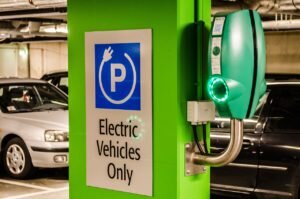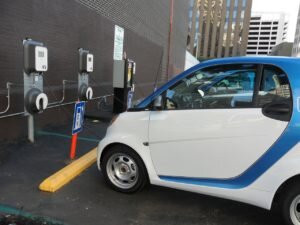Electric Cars Are Coming! When Owners Request Charging Stations, How Will Your Association Respond?
By Matthew Gaines and William Thompson
A newly enacted state law restricting the authority of condo associations to regulate the installation of electric car charging stations will apply only to condominiums located in Boston. But the implications extend well beyond Boston’s city limits. The reason: More consumers are buying electric cars. They purchased more than 360,000 of those vehicles in the U.S. last year – an 81 percent increase over 2017, which topped the previous year’s total by 26 percent. Analysts predict that there will be 18.7 million electric cars on U.S. roads 10 years from now. It is safe to assume that a significant number of those drivers will be living in condominium communities and needing someplace to charge their cars. It is also safe to assume that legislators in Massachusetts and other states will respond to that growing demand from condo owners by adopting measures similar to the one that applies now in Boston.The Cambridge City Council is already grappling with the issue. Concerned about the prospect of long extension cords running from the windows of apartments and condominium units to nearby ─ or not-so-nearby ─ parking lots, the Cambridge City Council has asked city staffers to find alternative ways owners of electric cars can charge their vehicles.The home rule petition the Massachusetts Legislature approved for Boston prohibits condo associations from barring or “unreasonably” restricting the ability of owners to install charging stations in areas where owners have exclusive use or in common areas, as long as the stations are located “within a reasonable distance of a dedicated parking space.” Some of the details ─ what constitutes an “unreasonable” restriction and what qualifies as a “reasonable distance” ─ will no doubt be the subjects of intense debates and possibly legal challenges. But one point is not subject to debate: Association boards in Boston no longer have the absolute right to approve or reject a charging station. If they deny a request, they must have a good reason for that decision.
They purchased more than 360,000 of those vehicles in the U.S. last year – an 81 percent increase over 2017, which topped the previous year’s total by 26 percent. Analysts predict that there will be 18.7 million electric cars on U.S. roads 10 years from now. It is safe to assume that a significant number of those drivers will be living in condominium communities and needing someplace to charge their cars. It is also safe to assume that legislators in Massachusetts and other states will respond to that growing demand from condo owners by adopting measures similar to the one that applies now in Boston.The Cambridge City Council is already grappling with the issue. Concerned about the prospect of long extension cords running from the windows of apartments and condominium units to nearby ─ or not-so-nearby ─ parking lots, the Cambridge City Council has asked city staffers to find alternative ways owners of electric cars can charge their vehicles.The home rule petition the Massachusetts Legislature approved for Boston prohibits condo associations from barring or “unreasonably” restricting the ability of owners to install charging stations in areas where owners have exclusive use or in common areas, as long as the stations are located “within a reasonable distance of a dedicated parking space.” Some of the details ─ what constitutes an “unreasonable” restriction and what qualifies as a “reasonable distance” ─ will no doubt be the subjects of intense debates and possibly legal challenges. But one point is not subject to debate: Association boards in Boston no longer have the absolute right to approve or reject a charging station. If they deny a request, they must have a good reason for that decision.
 Basic Requirements
Basic Requirements
Before they receive that first request, boards should develop written policies and procedures describing how they will review these applications and detailing the requirements they will impose on electric car owners. While Boston associations can’t prohibit charging stations, they can dictate where they will be located. Boards also can, and should:
- Require owners to pay for installation and maintenance costs, along with any structural modifications required;
- Require owners to pay for electricity used to recharge their vehicles, including the cost of installing a separate meter, if necessary, to monitor usage;
- Require owners to pay for any additional insurance requires, and to indemnify the association for any damages resulting for the installation, use or maintenance of the charging equipment
- Insist on reviewing the installation plans and approving the contractors owners use;
The advice for Boston condo associations – start thinking now about how they will respond to charging station requests – applies equally to associations in other communities. Communities that aren’t subject to the Boston legislation can still reject installations in common areas and limited common areas. So the first question for them will be: Do you want to allow these installations?There are many good reasons for doing so, primary among them: It is likely that owners and prospective owners who don’t own electric cars now will acquire them in the future. As electric car ownership grows, charging stations may become a desirable amenity, giving communities offering them a marketing advantage. To help answer this base line question (do you want to allow charging stations), boards might want to poll existing owners to gauge their current preferences and future plans.
Parking Problems
Communities that allow charging stations ─ either because they want them or (in Boston) can’t prohibit them, will have to consider where the equipment will be located. This may be one of the most challenging questions some boards will confront. If parking spaces aren’t deeded or assigned or if parking is limited, some owners will almost certainly object ─ loudly ─ if a scarce spot or a particularly desirable one is reserved for the exclusive use of an electric car owner. Even a deeded or assigned space may be problematic if it is located an unreasonable distance from the electrical source. Owners with better-located deeded spots might be willing to exchange them, but boards couldn’t order them to do so. Boards could shuffle spaces that are assigned but not owned – but not without infuriating the owners whose reassigned spaces end up furthest from the entrance rather than closest to it.Owners will need permission to modify a parking space they don’t own in order to install the charging station, and boards have the authority to grant an easement for this purpose. But licensing may be a better option because easements are permanent; they would be transferred to future buyers who may not need or want the charging station. A license is revocable and can be terminated when the existing owner leaves. The licensing agreement should specify that the owner will be responsible for removing the equipment and restoring the area if a future buyer doesn’t want to take over the license.
If parking spaces aren’t deeded or assigned or if parking is limited, some owners will almost certainly object ─ loudly ─ if a scarce spot or a particularly desirable one is reserved for the exclusive use of an electric car owner. Even a deeded or assigned space may be problematic if it is located an unreasonable distance from the electrical source. Owners with better-located deeded spots might be willing to exchange them, but boards couldn’t order them to do so. Boards could shuffle spaces that are assigned but not owned – but not without infuriating the owners whose reassigned spaces end up furthest from the entrance rather than closest to it.Owners will need permission to modify a parking space they don’t own in order to install the charging station, and boards have the authority to grant an easement for this purpose. But licensing may be a better option because easements are permanent; they would be transferred to future buyers who may not need or want the charging station. A license is revocable and can be terminated when the existing owner leaves. The licensing agreement should specify that the owner will be responsible for removing the equipment and restoring the area if a future buyer doesn’t want to take over the license.
Feasibility Questions
Feasibility may also be an issue for some boards. Even in Boston, where boards can’t “unreasonably restrict” charging stations, the installations may not be feasible, because parking areas are to far from the electrical source required for the charging stations, or because the community’s electrical system can’t support them. Many feasibility issues, if not all of them, can probably be resolved by existing technologies or new ones that will evolve as electric car usage becomes more widespread. One easy solution that doesn’t require innovative technology: An outmoded electrical system can be upgraded. Although all owners presumably would benefit from the upgrade, the electric car owner, for whom it is essential, should arguably be required to pay for it.Although most of the policies we’ve outlined are based on a ‘user-should-pay’ philosophy, some associations may want to consider making the installation of charging stations an association expense. The more owners who have electric cars or anticipate acquiring them, the stronger the argument for this approach and the greater the likelihood that owners will approve it.Instead of having owners install stations one at a time and dealing with location and parking issues with each application, boards may find it preferable to install a central charging station, accessible to all owners. Anticipating future demand, boards may also want to consider a station that has multiple outlets.Installation costs will be a consideration, of course, but as the electric car market grows, the cost of charging stations will probably fall and financing options may expand. For example, New Jersey is now offering grants reimbursing multifamily properties, including condos, for 60 percent of the cost of installing charging stations, to a maximum of $6,000. Other communities, looking to encourage reliance on renewable energy, may offer similar programs.
Many feasibility issues, if not all of them, can probably be resolved by existing technologies or new ones that will evolve as electric car usage becomes more widespread. One easy solution that doesn’t require innovative technology: An outmoded electrical system can be upgraded. Although all owners presumably would benefit from the upgrade, the electric car owner, for whom it is essential, should arguably be required to pay for it.Although most of the policies we’ve outlined are based on a ‘user-should-pay’ philosophy, some associations may want to consider making the installation of charging stations an association expense. The more owners who have electric cars or anticipate acquiring them, the stronger the argument for this approach and the greater the likelihood that owners will approve it.Instead of having owners install stations one at a time and dealing with location and parking issues with each application, boards may find it preferable to install a central charging station, accessible to all owners. Anticipating future demand, boards may also want to consider a station that has multiple outlets.Installation costs will be a consideration, of course, but as the electric car market grows, the cost of charging stations will probably fall and financing options may expand. For example, New Jersey is now offering grants reimbursing multifamily properties, including condos, for 60 percent of the cost of installing charging stations, to a maximum of $6,000. Other communities, looking to encourage reliance on renewable energy, may offer similar programs.
Revenue Opportunities
Some companies will install charging stations at no cost under a licensing agreement similar to the agreements covering laundry facilities: Owners using the charging equipment pay a fee to the company, which in turn pays a specified amount to the association. The licensing agreement should address liability issues. An agreement we drafted for an association client required the company and the owner both to indemnify the association against claims for damages related to the installation or maintenance of the charging station. Instead of leasing the equipment, some associations may want to purchase it outright and retain all the revenue generated by user fees. Up-front acquisition costs and ongoing maintenance expenses will factor into the appeal of this alternative. Any income the association earns may also have tax implications, which the board should discuss with the association’s accountant.Most condo associations haven’t had to address the questions electric cars will raise. It may be years before your board gets its first inquiry about the availability of charging stations or its first request to install one. But it is also possible that a resident of your community will drive up in an electric car tomorrow and ask where she can plug it in. The question is not whether but when your board will have to address the issue. It’s probably a good idea to start thinking about it now.
Instead of leasing the equipment, some associations may want to purchase it outright and retain all the revenue generated by user fees. Up-front acquisition costs and ongoing maintenance expenses will factor into the appeal of this alternative. Any income the association earns may also have tax implications, which the board should discuss with the association’s accountant.Most condo associations haven’t had to address the questions electric cars will raise. It may be years before your board gets its first inquiry about the availability of charging stations or its first request to install one. But it is also possible that a resident of your community will drive up in an electric car tomorrow and ask where she can plug it in. The question is not whether but when your board will have to address the issue. It’s probably a good idea to start thinking about it now.
